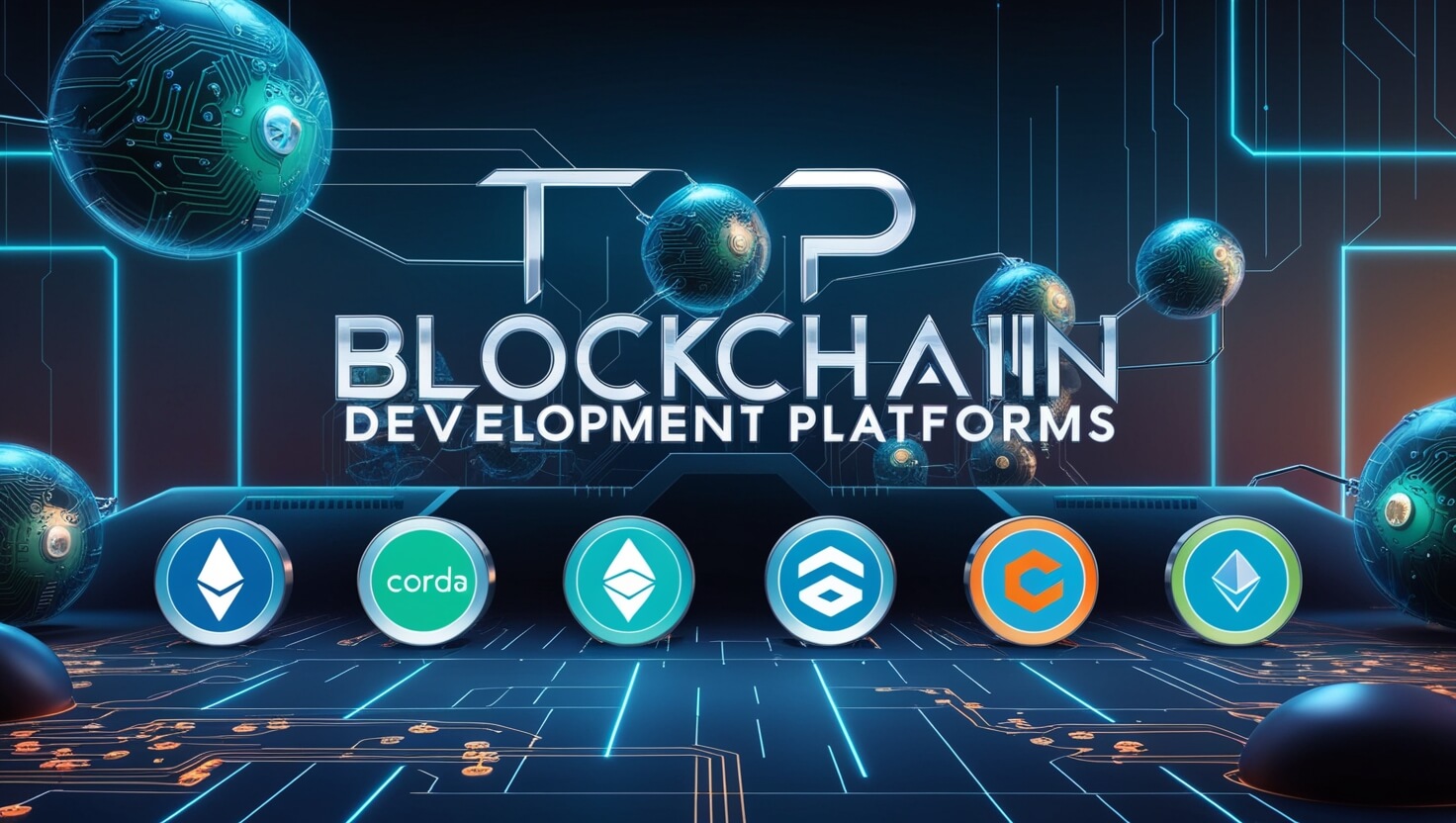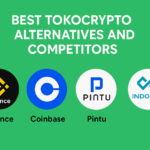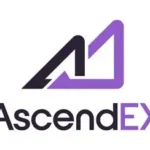In this article, I will talk about the Top Blockchain Development Platforms. It is equally important to choose a trustworthy broker as it is to exercise proper trading and investing.
The best brokers in Italy have minimum charging of commissions, sophisticated trading platforms, and cater to a global clientele, both novice and expert traders alike.
This guide help you through the most important brokers so that you can take the best investment decisions.
Key Point & Top Blockchain Development Platforms
| Platform | Key Point |
|---|---|
| Ethereum | Leading platform for smart contracts and decentralized applications (dApps). |
| Corda | Focuses on privacy and enterprise use cases, especially in finance. |
| Hyperledger | A permissioned blockchain framework for enterprises, focusing on privacy. |
| Polkadot | Enables interoperability between multiple blockchains, supporting scalability. |
| Cardano | Known for its scientific approach, focusing on security and sustainability. |
| Solana | High-speed, low-cost transactions, ideal for scalable decentralized apps. |
| Tezos | Self-amending blockchain, allowing continuous upgrades and formal verification. |
| EOSIO | Scalable platform for decentralized applications with a focus on performance. |
| Stellar | Optimized for cross-border payments and low-cost financial transactions. |
1. Ethereum
Ethereum is one the most used and advanced blockchain platforms, it is known for its support of smart contracts and decentralized applications (dApps).
Ethereum started in 2015 and allows developers to craft self-executing contracts which automatically impose the terms of an agreement without any middlemen.
It’s native cryptocurrency is called Ether (ETH), which is spent on transaction costs and computational resources within the estimated system. Ethereum is famous for having a large and active developer community that builds an ecosystem of decentralized finance (DeFi) tools, non-fungible tokens (NFTs), and other blockchain economy products.
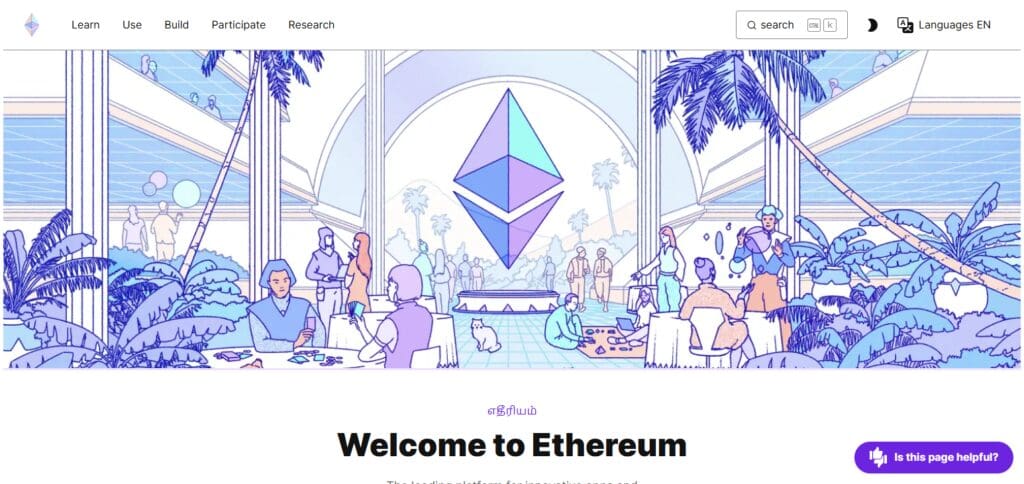
When transitioning to Ethereum 2.0, it moved from proof-of-work (PoW) consensus mechanism, to a more friendly to the environment proof-of-stake (PoS) model, helping improve scalability, transaction speed, and sustainability.
Because of its flexibility, extensive community support, and development focused on solving scalability issues, Ethereum is still one of the cornerstones in the blockchain world.
| Feature | Details |
|---|---|
| Platform Name | Ethereum |
| Founded | 2015 |
| Consensus Mechanism | Proof of Stake (PoS) |
| Smart Contracts | Supports smart contracts using Solidity programming language |
| Token Standard | ERC-20, ERC-721, and ERC-1155 for token creation |
| Use Cases | DeFi, NFTs, DApps, and enterprise blockchain solutions |
| Transaction Speed | ~15-45 transactions per second (TPS) |
| Market Cap | Second-largest cryptocurrency by market cap after Bitcoin |
2. Corda
Corda is a corporately focused, permissioned blockchain which takes privacy, scalability, and regulatory compliance into consideration. It was devoloped by R3 which has Corda adopted widely in finance, insurance, and supply chain industries.
Just like other blockchains, Corda does not need every participant to have a full copy of the ledger.
Corda allows participants to access only pertinent transaction data which enhances performance and privacy simultaneously.
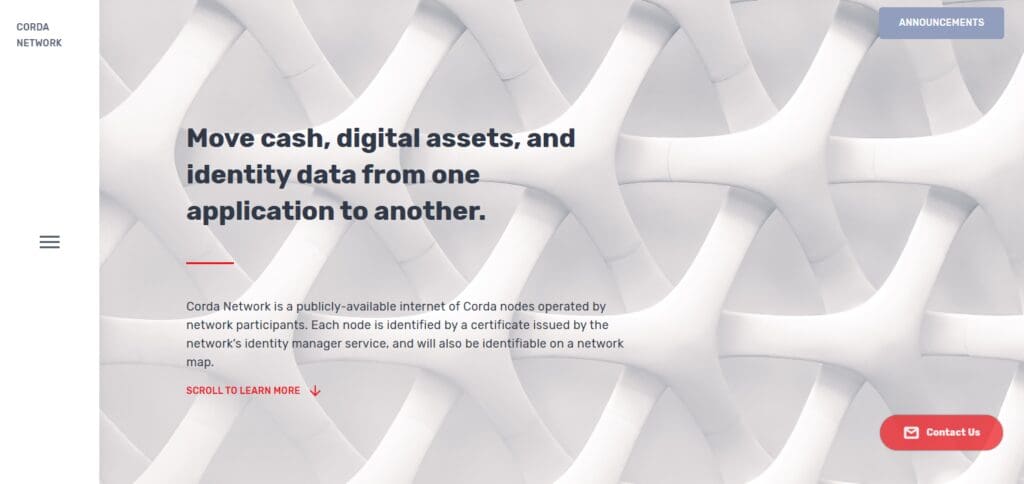
Corda is uniquely designed for industries which require secure, private, and public transactions under the regulations like finance and insurance. With Corda, business processes are esnabled because it allows direct peer-to-peer transactions without the need of intermediaries.
Because of the strong emphasis on data privacy and scalability, Corda is ideal for use cases where there is the need for confidentiality and trust.
| Feature | Details |
|---|---|
| Platform Name | Corda |
| Founded | 2016 |
| Developer | R3 Consortium |
| Consensus Mechanism | Notary-based consensus (no mining, uses trusted notary nodes) |
| Smart Contracts | Supports smart contracts written in Kotlin and Java |
| Use Cases | Financial services, supply chain, trade finance, and healthcare |
| Transaction Speed | ~600 transactions per second (TPS) |
| Key Feature | Focuses on privacy and permissioned networks for enterprises |
3. Hyperledger
Developed by The Linux Foundation, Hyperledger is a global open-source collaborative blockchain project that hosts the development of enterprise-grade permissioned blockchains.
Hyperledger, in contrast to public blockchains, offers a collection of modular frameworks and tools, including Hyperledger Fabric and Hyperledger Sawtooth, which enables businesses to build secure, private, and scalable blockchain systems.
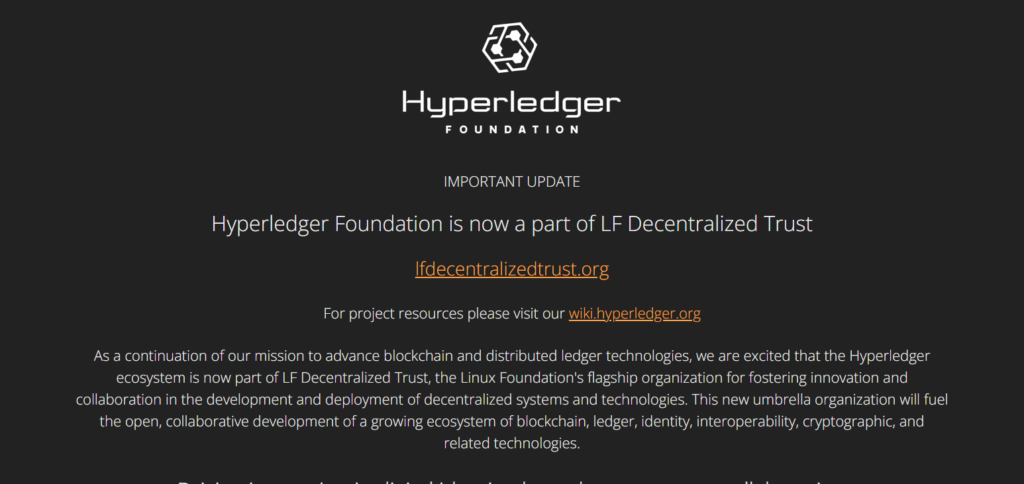
Its flexibility makes it suitable for different sectors such as supply chain, healthcare, and finance where security, privacy, and compliance remain the highest priorities. With Hyperledger, only authorized participants can access the network, which results in enhanced control over sensitive data and improved information security.
Furthermore, Hyperledger can be tailored to specific cases which ensures that businesses have control over the level of governance, privacy, and security cybersecurity measures.
| Feature | Details |
|---|---|
| Platform Name | Hyperledger |
| Founded | 2015 |
| Developer | Linux Foundation |
| Consensus Mechanism | Pluggable consensus (e.g., Kafka, Raft, and PBFT) |
| Smart Contracts | Supports chaincode written in Go, Java, and JavaScript |
| Use Cases | Supply chain, finance, healthcare, and identity management |
| Transaction Speed | ~3,000 transactions per second (TPS) |
| Key Feature | Permissioned, modular architecture for enterprise-grade solutions |
4. Polkadot
Polkadot is a blockchain platform that enables different blockchains to connect and communicate securely and efficiently. It was developed by Web3 Foundation and led by Gavin Wood, an Ethereum co-founder.
Unlike other single-chain blockchains, Polkadot uses a multi-chain architecture which integrates separate networks into a singular system. Each of these networks, called parachains, work autonomously with their own individual security and governance features.
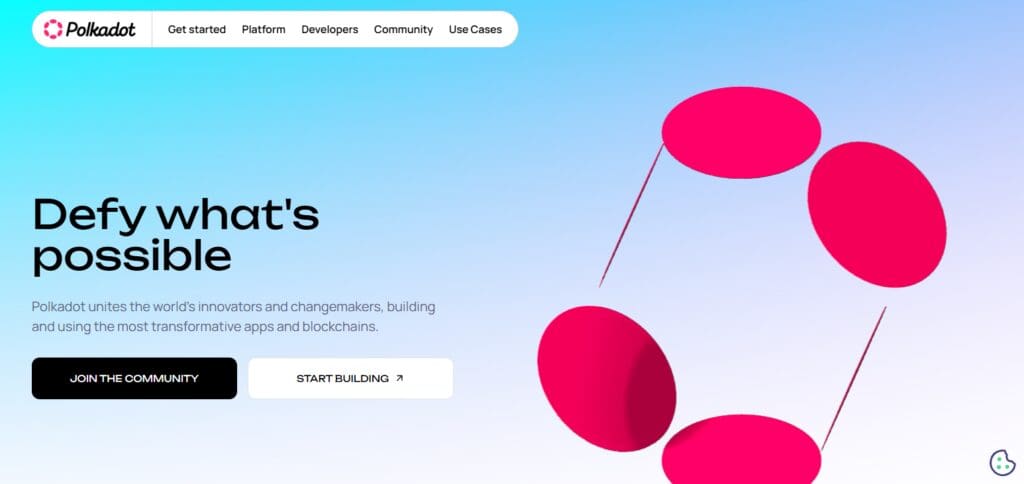
The integration of cross-chain communication created by Polkadot allows for scalable projects that utilize multiple blockchain networks. Developers also have the option to create customized blockchains that suit their needs with no compromises made to security and decentralization.
With Radix’s focus on interoperability, scalability, and flexibility, Polkadot proves to be the solution for the next decentralized applications and services.
| Feature | Details |
|---|---|
| Platform Name | Polkadot |
| Founded | 2020 |
| Developer | Web3 Foundation |
| Consensus Mechanism | Nominated Proof of Stake (NPoS) |
| Smart Contracts | Supports smart contracts on parachains using Substrate framework |
| Use Cases | Cross-chain interoperability, DeFi, NFTs, and DApps |
| Transaction Speed | ~1,000 transactions per second (TPS) |
| Key Feature | Enables interoperability between multiple blockchains (parachains) |
5. Cardano
Cardano, a blockchain platform, is more focused on security, scalability, and sustainability development when compared to other platforms.
Cardano is different from other blockchain platforms in the sense that it uses peer-reviewed academic research to direct its development and has secure protocols based on scientific evidence.
Its consensus mechanism, Ouroboros, is a type of proof-of-stake which is more energy efficient compared to proof-of-work methods. The structure of Cardano is built with two layers; the settlement layer, which deals with transactions, and the computation layer, which is responsible for smart contracts.
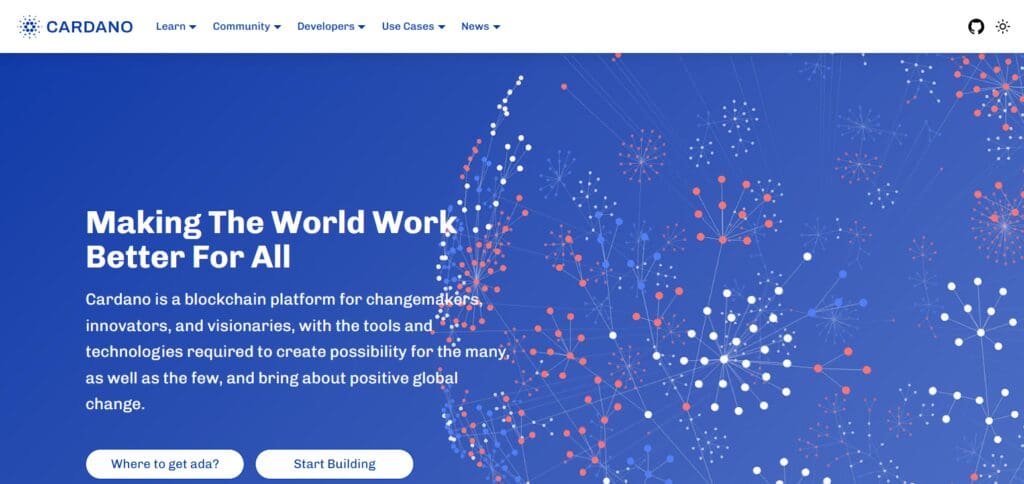
This division aids in enhanced scalability as well as upgrades. Industries like finance, education, and healthcare have started to adopt Cardano due to its focus on creating a sustainable blockchain ecosystem.
Cardano blockchain is continuously developed in order to make it suitable for decentralized applications and smart contracts by balancing security, scalability, and decentralization making it prospective infrastructure for long-term sustainable development.
| Feature | Details |
|---|---|
| Platform Name | Cardano |
| Founded | 2017 |
| Developer | Input Output Global (IOG) |
| Consensus Mechanism | Proof of Stake (PoS) – Ouroboros protocol |
| Smart Contracts | Supports smart contracts using Plutus and Marlowe languages |
| Use Cases | DeFi, NFTs, DApps, and enterprise solutions |
| Transaction Speed | ~250 transactions per second (TPS) |
| Key Feature | Secure, scalable, and eco-friendly with peer-reviewed development |
6. Solana
Due to its remarkable scalability and cost-efficient transactions, Solana stands out as a high-performance blockchain platform. Solana can process thousands of transactions per second (TPS) making it one of the fastest blockchains.
Transactions speed is supported by its unique consensus mechanism Proof-Of-History (PoH) which creates a historical record and validates transactions more efficiently.
This record provides evidence that transactions took place during a precise point in time. Its alongside Proof-of-Stake (PoS) mechanism guarantees both security and scalability while maintaining decentralization.
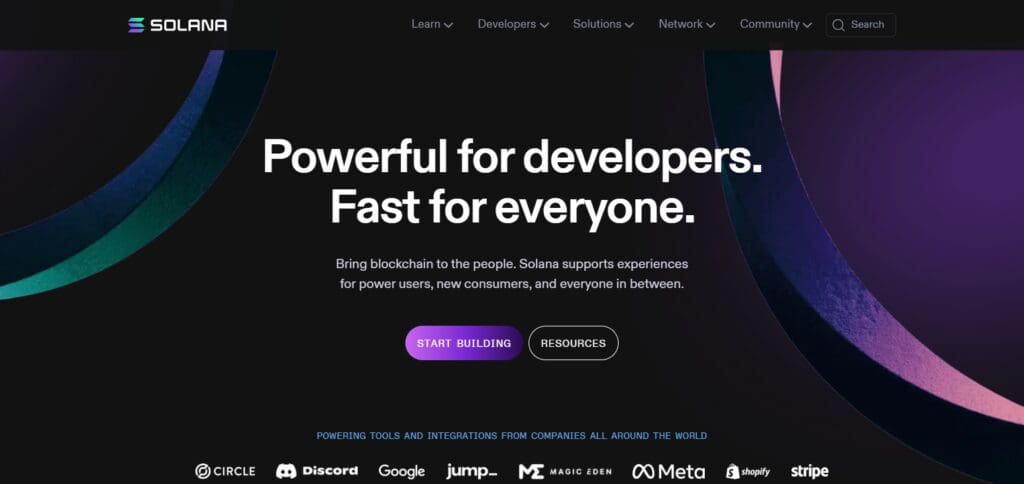
Solana is a great fit for decentralized applications (dApps) that demand high throughput including decentralized finance (DeFi), gaming, and NFTs because of its high TPS.
With an ever-growing developer community and multiple projects wanting to take advantage of its low transaction fees and high scalability makes Solana a leading candidate in the blockchain space for applications that require speed and efficiency.
| Feature | Details |
|---|---|
| Platform Name | Solana |
| Founded | 2020 |
| Developer | Solana Labs |
| Consensus Mechanism | Proof of History (PoH) + Proof of Stake (PoS) |
| Smart Contracts | Supports smart contracts using Rust and C programming languages |
| Use Cases | DeFi, NFTs, DApps, and payment processing |
| Transaction Speed | ~65,000 transactions per second (TPS) |
| Key Feature | High-speed, low-cost transactions with scalable architecture |
7. Tezos
Tezos was created with a purpose: a self-amending blockchain designed to be secure and scalable, providing clean infrastructure for decentralized applications (dApps) and smart contracts.
Unlike other competitors, Tezos has exceptional features with its governance model that allows the network to upgrade itself without the need for hard forks. Utilizing an on-chain governance system, stakeholders can vote on certain protocol amendments that bring about such developments while reducing the risk of fractuous forks.
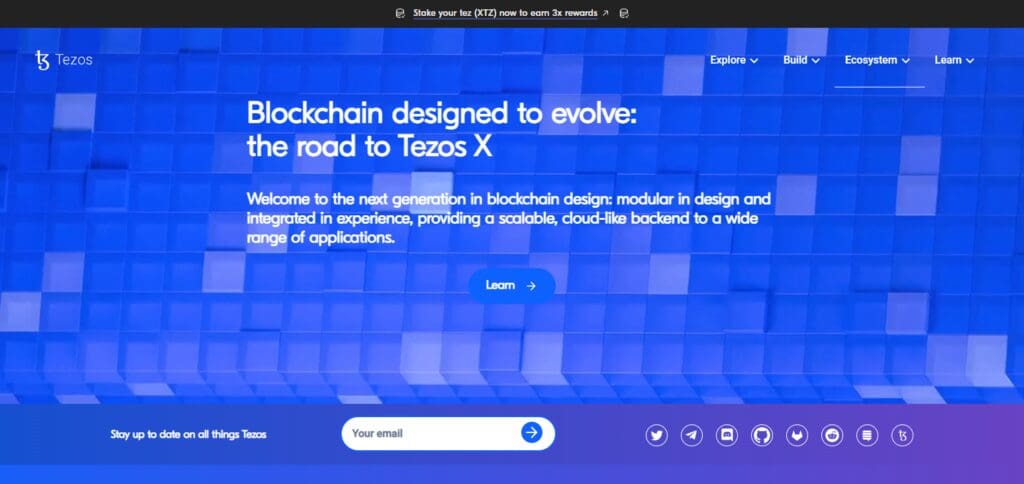
With a Liquid Proof-of-Stake (LPoS) consensus mechanism at hand, Tezos is able to provide energy-efficient security while being robustly secured and decentralized, Makng it even more remarkable for developers seeking a flexible yet sustainable blockchain.
Ed, a popular platform amongst various domains such as finance, supply chain, and gaming is widely known for putting emphasis on verified and secure smart contracts. The self-amending nature and use of formal verification makes Tezos an appealing candidate for blockchain development over time.
| Feature | Details |
|---|---|
| Platform Name | Tezos |
| Founded | 2018 |
| Developer | Tezos Foundation |
| Consensus Mechanism | Liquid Proof of Stake (LPoS) |
| Smart Contracts | Supports smart contracts using Michelson and SmartPy languages |
| Use Cases | DeFi, NFTs, DApps, and tokenized assets |
| Transaction Speed | ~1,000 transactions per second (TPS) |
| Key Feature | Self-amending blockchain with on-chain governance |
8. EOSIO
EOSIO is designed as a high-performance blockchain platform predominantly focusing on the development and deployment of dApps while maintaining a low transaction cost.
One of EOSIO’s standout features is the Delegated Proof-of-Stake (DPoS) consensus mechanism that allows for better scalability and faster block production relative to Proof-of-Work (PoW) systems.
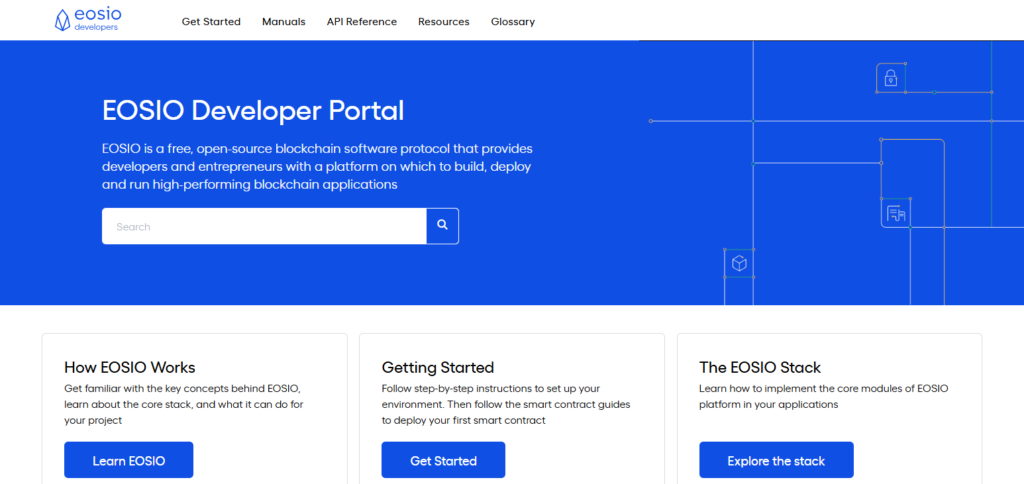
Such performance makes EOSIO ideal for scalability-sensitive applications such as social media, gaming, and financial applications. EOSIO features an ecosystem that provides smart contracts, near-instant transaction finality, and the ability to handle millions of transactions per second.
Furthermore, the platform comes with simplified design features, enabling developers to easier create and deploy their dApps. Given its superior performance, EOSIO is advantageous for enterprises and developers that seek to build fast, efficient, and scalable decentralized applications.
| Feature | Details |
|---|---|
| Platform Name | EOSIO |
| Founded | 2018 |
| Developer | Block.one |
| Consensus Mechanism | Delegated Proof of Stake (DPoS) |
| Smart Contracts | Supports smart contracts using C++ programming language |
| Use Cases | DeFi, DApps, supply chain, and enterprise solutions |
| Transaction Speed | ~4,000 transactions per second (TPS) |
| Key Feature | High-speed, low-fee transactions with scalable architecture |
9. Stellar
Stellar is a blockchain that focuses on providing low-cost and secure payments and assets transfer between different currencies. Stellar operates without the use of traditional intermediaries which greatly improves the speed and reduces the cost associated with global remittances. Stellar enables peer-to-peer transactions.
Its Stellar Consensus Protocol allows for speedy transaction processing while maintaining optimum security and decentralization. Stellar allows the creation of custom tokens and non-fungible selfies beyond just payments.
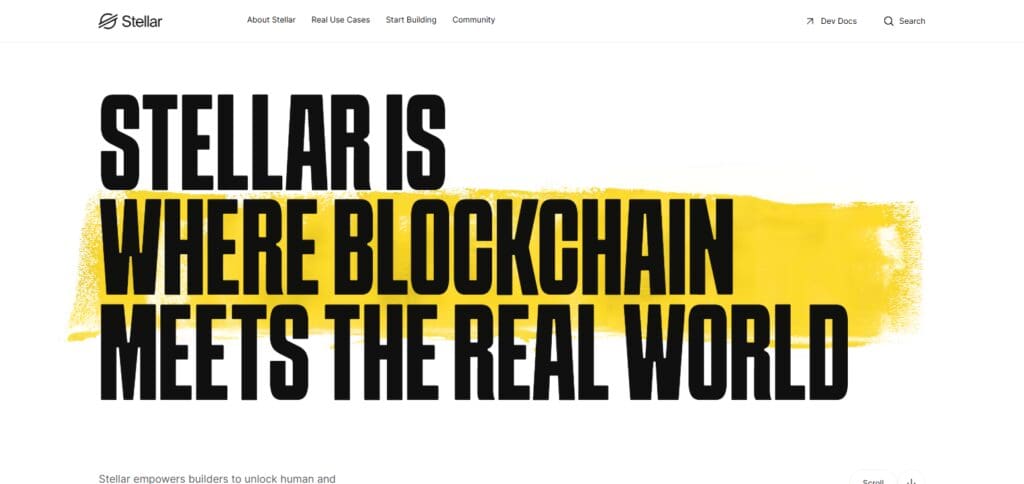
Stellar is hyper-focused on financial inclusion of individuals and businesses based in remote regions that are economically underserved. The platform facilitates tokenization of assets as well as supporting DeFi applications.
Stellar links banks and payment providers enabling seamless access to services. This gives Stellar the capability to reshape the global economy and become a powerhouse in current-day finance by providing an easily adjustable solution for cross-border transactions.
| Feature | Details |
|---|---|
| Platform Name | Stellar |
| Founded | 2014 |
| Developer | Stellar Development Foundation (SDF) |
| Consensus Mechanism | Stellar Consensus Protocol (SCP) |
| Smart Contracts | Supports basic smart contracts through multi-signatures and batching |
| Use Cases | Cross-border payments, remittances, and asset tokenization |
| Transaction Speed | ~1,000 transactions per second (TPS) |
| Key Feature | Fast, low-cost transactions for financial services |
Conclusion
Blockchain development platforms including Ethereum, Corda, Hyperledger, Polkadot, Cardano, Solana, Tezos, EOSIO and Stellar continue to transform traditional industries using their advanced functionalities.
They’re specialized in smart contracts, decentralized applications (DApps), and secure transactions that scales readily, serving industries like finance, supply chain, and healthcare among others.
There are, however, emerging features in every platform in relation to interoperability, high transaction speed, and low transaction cost which makes it easier and more convenient to develop next generation solutions.
With the growing adoption of Blockchain, these platforms will tremendously improve stransparency, efficiency and trust will enhance the development of the digital ecosystem transforming the world economics and business models from – to multi.



